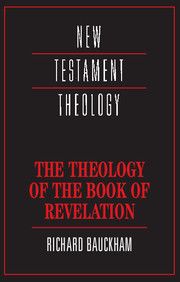Book contents
- Frontmatter
- Dedication
- Contents
- Editor's preface
- List of abbreviations
- 1 Reading the Book of Revelation
- 2 The One who is and who was and who is to come
- 3 The Lamb on the throne
- 4 The victory of the Lamb and his followers
- 5 The Spirit of prophecy
- 6 The New Jerusalem
- 7 Revelation for today
- Further reading
- Index
4 - The victory of the Lamb and his followers
Published online by Cambridge University Press: 05 November 2014
- Frontmatter
- Dedication
- Contents
- Editor's preface
- List of abbreviations
- 1 Reading the Book of Revelation
- 2 The One who is and who was and who is to come
- 3 The Lamb on the throne
- 4 The victory of the Lamb and his followers
- 5 The Spirit of prophecy
- 6 The New Jerusalem
- 7 Revelation for today
- Further reading
- Index
Summary
STATISTICS
We saw in our chapter 2 that the sevenfold occurrence of divine designations in Revelation is John's way of highlighting their significance. It will be worth looking at the statistics of some christological designations, to prepare us for our study of the work of Christ in Revelation.
That the identification of Christ with God does not imply the unimportance of his humanity is indicated by the use of his particular human name Jesus. This occurs fourteen times in Revelation, seven of these in the phrases ‘the witness of Jesus’ (1:2, 9; 12:17; 19:10 (twice); 20:4) and ‘the witnesses of Jesus’ (17:6). As we shall see, what matters most about the humanity of Jesus in Revelation is the witness which he bore and which his followers continue.
The word ‘Christ’ (Messiah) occurs seven times (including occurrences of ‘Jesus Christ’). As we shall see, Jesus' fulfilment of the Jewish hope of the Davidic Messiah is prominent in Revelation.
The word ‘Lamb’, referring to Christ, occurs 28 (7 × 4) times. Seven of these are in phrases coupling God and the Lamb together (5:13; 6:16; 7:10; 14:4; 21:22; 22:1, 3). Four is, after seven, the symbolic number most commonly and consistently used in Revelation. As seven is the number of completeness, four is the number of the world (with its four corners (7:1; 20:8) or four divisions (5:13; 14:7)). The first four judgments in each of the series of seven affect the world (6:8; 8:7–12; 16:2–9). The 7×4 occurences of ‘Lamb’ therefore indicate the worldwide scope of his complete victory.
- Type
- Chapter
- Information
- The Theology of the Book of Revelation , pp. 66 - 108Publisher: Cambridge University PressPrint publication year: 1993



